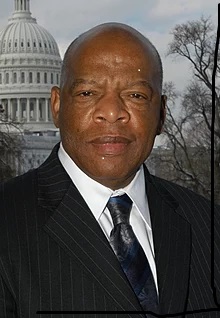

OCEANSIDE, California — As a seventeen-year-old lad from the gravely impoverished Troy, Alabama, John Lewis decided to write a letter to Rev. Martin Luther King Jr. in Montgomery. Lewis had breathlessly followed the recent narrative of King, Rosa Parks, and others during the successful eleven-month Montgomery Bus Boycott.
Not only did King write back to Lewis, he also included in the letter a round-trip bus ticket to Montgomery and an invitation to meet him, which Lewis eventually did — in March 1958. “I was so scared. I didn’t know what to say or what to do,” Lewis recalled. “And Dr. King said, ‘Are you the boy from Troy?'” [Source: NPR]
Soon enough, the burly, taciturn, fiercely dogged Lewis emerged as a captain of the Nashville Student Movement of lunch-counter sit-ins and was a key in establishing the Freedom Riders. Both the sit-ins, which broke the back of retail segregation, and the Freedom Riders, who perilously rode Greyhound buses into the apartheid centers of the Old Confederacy, suffered extraordinary, sometimes lethal violence at the hands of white folks and their guarantors among the white sheriffs and deputies of Dixie.
Members of the Nashville Student Movement, who would go on to lead much of the activities and strategies of the 1960s Civil Rights Movement, included Jim Lawson, Lewis, Diane Nash, Bernard Lafayette, James Bevel, C. T. Vivian, among other stalwarts. John Lewis evolved into a primary subordinate to Martin Luther King Jr. and, eventually, a renowned member of Congress from Atlanta. In his election to the House, the plain-speaking, squat, almost wooden Lewis pulled off a surprising defeat of the elegant and fashionable Julian Bond.
Of course, Lewis became a global icon when he led the near-tragic 1965 “Bloody Sunday” march for voting rights across the Edmund Pettus Bridge in Selma. King was not there that day (and suffered criticism for it). John Lewis, as determined as he was diminutive, was at the helm. Armed with gas canisters and nightsticks, Alabama state troopers were flanked by horse-riding members of the sheriff’s posse. A fanged crowd of whites milled around nearby. In a direct attack on the protesters, the police pummeled Lewis with exuberant fury and he nearly died from having his skull broken.
In 1996, over a quiet lunch in Washington, John Lewis told me: “The police and [Sheriff] Jim Clark came at us with clubs and dogs and tear gas pellets. They knocked people unconscious, bludgeoning them from their horses. It was pure terror. We never got across the bridge, of course. Martin was in Atlanta and he was just sickened. People were lying all around, beaten, and choking and just screaming. We just wanted to demonstrate that we wanted the right to vote like anybody else.”
Lewis did not mention to me that he himself was struck repeatedly by troopers and sustained serious head and body injuries. But he did remember that the marchers pleaded for federal protection so that they could proceed in safety. After the attack, Lewis, bandaged and bloodied, declared: “‘I don’t see how President Johnson can send troops to Vietnam, I don’t see how he can send troops to the Congo, I don’t see how he can send troops to Africa and can’t send troops to Selma.”
Newsreels captured the flagrant police assault on the peaceful marchers trying to walk across a bridge to claim their right to vote. The televised carnage affected the nation and moved President Lyndon B. Johnson. In an unprecedented declaration of empathy for African Americans, Johnson spoke to Congress a few nights later and announced: “Their cause must be our cause too. Because it is not just Negroes, but really it is all of us, who must overcome the crippling legacy of bigotry and injustice.”
John Lewis, treasured by Dr. King, deemed “my hero by President Barack Obama, unassailably principled, was a muscular little prophet who never turned around during his lifelong march for freedom. In a singular fashion, without pizzazz, he did something truly historic: he unsettled and re-appropriated the fireflies, mint juleps, and secret social agreements of the stubbornly benighted American South.
Even the Confederate flag has finally bowed to his grace. God rest the soul of the boy from Troy.
*
Ben Kamin is a writer and lecturer on the life of the Rev. Martin Luther King Jr. He is a resident of Oceanside, California.